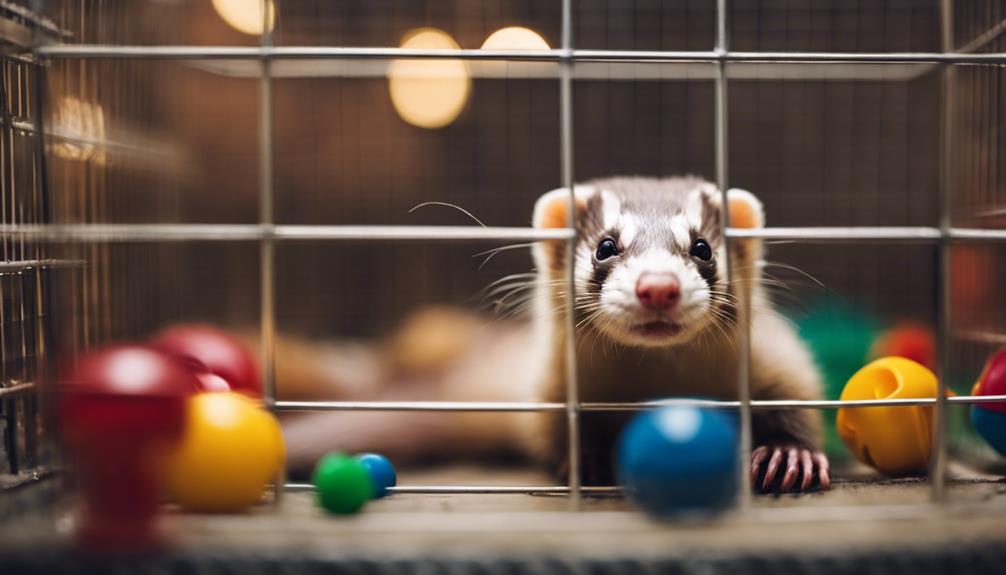What To Do If Your Ferret Shows Signs of Stress

If your ferret is showing signs of stress, there are several things you can do to help them feel more comfortable:
- Create a safe and quiet space for your ferret to retreat to, with their favorite bedding and toys.
- Ensure that your ferret's environment is enriched with tunnels, hammocks, and toys to keep them mentally stimulated.
- Stick to a consistent routine for feeding, playtime, and bonding to provide a sense of security and stability.
- Spend quality time with your ferret by providing interactive play sessions and gentle handling to build trust and reduce stress.
- Monitor your ferret's health and behavior closely, and consult a veterinarian if you notice any persistent signs of stress or anxiety.
Remember that each ferret is unique, so it may take some time to figure out what works best for your furry friend. By being attentive and providing a supportive environment, you can help your stressed ferret feel more at ease and content.
Recognizing Signs of Ferret Stress
Unlocking the Secret Language of Ferret Stress
Hey there, ferret friends! Have you ever wondered how to tell if your fuzzy buddy is feeling stressed out? Well, fret not! Let's dive into the world of ferret stress signals and learn how to help our little pals feel better.
Spotting Stress Signs
- Do you notice your ferret scratching, biting, or hiding more than usual? These could be signs of stress.
- Keep an eye out for changes in your ferret's behavior, as they might be trying to tell you something isn't right.
Finding Stress Triggers
- Loud noises, changes in their environment, or even boredom can stress out your ferret.
- By watching your ferret closely, you can figure out what's bothering them and help make things better.
Relieving Stress
- Want to help your ferret chill out? Try giving them fun activities to keep their minds busy.
- Establishing a routine and rewarding calm behavior can also work wonders in reducing stress levels.
Creating a Calm Environment

To help ferrets thrive, it's crucial to maintain peaceful surroundings and minimize loud noises in their environment. Creating a calm atmosphere can greatly reduce stress levels and promote their well-being.
Peaceful Surroundings
Creating a Relaxing Space for Your Ferret
Do you want your ferret to feel calm and happy? Here are some tips to make their environment peaceful:
- Nice Smells: Have you tried using scents like lavender or chamomile to help your ferret relax?
- Music Magic: Did you know that soft, soothing music can make your ferret feel peaceful?
- Sunshine Time: Giving your ferret access to natural light can help them sleep better and feel more relaxed.
- Comfy Bed: Have you thought about providing a cozy and safe sleeping area for your ferret?
Minimize Loud Noises
How to Keep Your Ferret Happy and Calm
Do you want to ensure your ferret feels safe and relaxed? One important step is to minimize loud noises in their environment. Here's why and how:
Why are loud noises a problem for ferrets?
- Ferrets can get stressed or anxious from loud sounds.
- Loud noises may trigger behavior issues in ferrets.
What can you do to help?
- Use soundproofing solutions in their living area.
- Employ behavior modification techniques to desensitize your ferret to loud sounds gradually.
Why is a peaceful environment important for your ferret?
- Minimizing noise sensitivity can significantly improve your ferret's well-being.
- Your furry friend will feel more secure and relaxed in a quiet space.
Providing Enrichment Activities

Ferrets thrive on mental stimulation and physical activity to stay happy and healthy. Introducing a toy rotation schedule, engaging in hide-and-seek games, or setting up a DIY obstacle course are great ways to keep your ferret entertained and mentally sharp.
These enrichment activities can help alleviate stress and provide a fun outlet for your furry friend's natural instincts.
Toy Rotation Schedule
Feeling bored or stressed? Your ferret might be too! Spice up their playtime with these fun and interactive ideas. Let's dive in and learn how to keep your furry friend entertained and happy:
- Puzzle Toys: Challenge your ferret's brain with puzzle toys. Watch them figure out the mysteries and have a blast!
- Ball Pit: Imagine a mini playground for your ferret filled with colorful balls. They'll have a ball of a time exploring and playing in their very own ball pit.
- Tunnel Fun: Set up a fun obstacle course with tunnels for your ferret to zoom through. It's like a race track for your furry friend!
- Feather Wand: Tap into your ferret's wild side with a feather wand. Watch them pounce and play like a little hunter.
Hide-And-Seek Games
Are you looking for a fun way to keep your ferret active and entertained? Let's talk about playing hide-and-seek with your furry friend! This game isn't only enjoyable but also great for your ferret's physical and mental well-being. Let's dive into the benefits and how to play this exciting game with your pet.
Benefits of Hide-and-Seek Games:
- Provides indoor exercise for your ferret
- Offers mental stimulation to keep them sharp
- Strengthens your bond and trust with your pet
How to Play Hide-and-Seek:
- Find safe hiding spots around your home, like behind furniture or in a blanket fort.
- Encourage your ferret to find you or their favorite toy using scent cues.
- Use high-pitched, encouraging tones to guide your ferret during the game.
- Start with easy hiding spots and gradually increase the difficulty for more challenge and fun.
Tips for a Great Hide-and-Seek Experience:
- Use treats or gentle praise as positive reinforcement.
- Make the game enjoyable by keeping it light-hearted and fun.
- Spend quality time with your ferret while engaging in this interactive activity.
DIY Obstacle Course
Are you looking to create an awesome playground for your ferret? Let's build a fun obstacle course that will keep your furry friend entertained and active! Check out these cool ideas:
- Tube Time: Use PVC pipes or cardboard tubes to create tunnels for your ferret to explore. It's like a secret hideout just for them!
- Playground Paradise: Set up hammocks, tunnels, and climbing structures to make a mini playground for your ferret. They'll feel like they're in a jungle gym!
- Tasty Treasures: Hide treats along the course to encourage your ferret to sniff around and hunt for yummy surprises. It's like a treasure hunt just for them!
- Toy Bonanza: Add interactive toys like balls or puzzle feeders to keep your ferret engaged and mentally stimulated. They'll have a blast playing with these fun gadgets!
Establishing Routine and Consistency

Creating a Happy Routine for Your Ferret
Hey there, ferret lovers! Want to make sure your furry friend feels safe and happy? Well, one way to do that's by setting up a regular routine for them. Let's dive into why routines are essential and how you can create one for your playful pet!
Why Routines Matter for Ferrets:
- Ferrets love knowing what to expect, just like you do!
- A consistent routine helps reduce stress and build trust with your ferret.
- It gives your pet a sense of security and stability in their environment.
Tips for Establishing a Ferret Routine:
- Feeding Time: Feed your ferret at the same time each day.
- Playtime: Schedule daily play sessions to keep your ferret active and engaged.
- Exercise: Make sure your ferret gets enough exercise by providing playtime and space to roam.
- Social Interactions: Spend quality time with your ferret to strengthen your bond.
Fun Activities to Include in Your Ferret's Routine:
- Interactive play sessions with toys like tunnels and balls.
- Exploring new toys to keep your ferret mentally and physically stimulated.
- Creating a cozy sleeping area for your ferret to rest and recharge.
Consulting With a Veterinarian

Are you worried about your ferret's health? Getting advice from a vet who knows about exotic pets can make a big difference! These experts can figure out what's bothering your ferret and suggest ways to help them feel better. Here's why talking to a vet who specializes in exotic pets is a great idea:
- They know a lot about how to take care of unique pets like ferrets.
- They can give you personalized tips to help your ferret behave better.
- They'll create stress-relief plans just for your ferret.
- Your ferret will get a full check-up to make sure they're healthy.
Implementing Relaxation Techniques

How can you help your ferret relax and unwind in stressful times? Let's explore some gentle techniques to create a serene environment for your furry friend:
- Have you tried using soft handling techniques to help your ferret feel calm and safe?
- Did you know that breathing exercises can promote relaxation in ferrets too?
- Picture this: setting up a cozy space with gentle lighting and soothing sounds for your ferret to meditate in peace.
- Mindfulness is key! Pay attention to your ferret's signals and respond accordingly to make them feel at ease.
- Relaxation exercises like gentle petting and providing comfy hideouts can work wonders for your ferret's stress levels.
Monitoring Progress and Adjusting Care

Keeping Your Ferret Happy and Healthy
Are you wondering how to make sure your ferret is feeling great? Well, monitoring their progress and adjusting their care is key! Let's dive into some simple steps you can take to ensure your fuzzy friend is relaxed and content.
Behavior Boost
- Want your ferret to show off their best behavior? Try using treats and praise to encourage good habits and reduce any stress they might be feeling.
Chill Out Zone
- Create a cozy and fun environment for your ferret with comfy hiding spots, toys to play with, and plenty of playtime. A happy ferret is a relaxed ferret!
Track and React
- Keep a diary or use apps to keep an eye on your ferret's behavior. By spotting any signs of stress early on, you can make changes to help them feel better.
Home Sweet Home
- Adjust your ferret's living space by keeping noise levels down, controlling the temperature, and providing the right amount of light. A comfortable environment is key to their happiness.
Frequently Asked Questions
Can Ferrets Suffer From Anxiety Disorders and What Are the Symptoms to Look Out For?
Ferrets can indeed experience anxiety disorders. Signs include excessive hiding, aggression, and changes in appetite. Managing anxiety through behavioral training is crucial. If signs persist, seeking professional help is recommended for proper diagnosis and treatment.
How Can I Help My Ferret Cope With Changes in Their Environment or Routine?
When helping a ferret cope with changes in their environment or routine, engage in playtime activities to distract and comfort them. Stick to comforting routines to provide stability and security, helping your furry friend adjust with ease.
Are There Any Natural Remedies or Supplements That Can Help Reduce Stress in Ferrets?
Herbal remedies, behavior modification, aromatherapy, and play therapy can help reduce stress in ferrets. These natural approaches can provide comfort and support to your furry friend during times of anxiety or change.
What Are Some Common Triggers for Stress in Ferrets and How Can I Avoid Them?
When it comes to ferrets, understanding stress triggers is key. By identifying and avoiding common stressors like loud noises or sudden changes, owners can create a calm environment. Behavior modification and gentle training techniques can also help.
Can Stress in Ferrets Lead to Other Health Problems and How Can I Prevent This?
Stress in ferrets can indeed lead to various health issues. To prevent this, ensure a calm environment, provide mental stimulation, and offer a balanced diet. Regular vet check-ups can help manage stress and catch any anxiety symptoms early for optimal ferret health.











